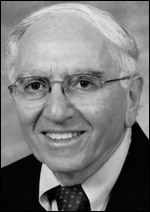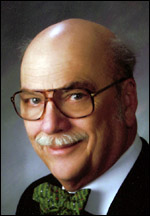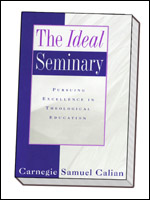 |
|
C. Samuel Calian, president of Pittsburgh Theological Seminary
|
When C. Samuel Calian, president of Pittsburgh Theological Seminary, set out to write The Ideal Seminary: Pursuing Excellence in Theological Education (Westminster John Knox Press), he sought to engage those with a stake in theological education in discussion, as did we when we adapted parts of it for our New Year 2002 “Perspective” department. Our hopes were realized when Glenn Miller, the Waldo Professor of Ecclesiastical History at Bangor Theological Seminary, e-mailed congratulations and criticisms to Calian. Soon, thanks to the web, they found themselves well-embroiled in a spirited discussion. Our new department—“AfterWords”—intends to revisit past issues in the light of the discussion they generate, and you can consider it an invitation. Your further comments can be e-mailed to editors@intrust.org or posted in our Discussion Groups. Please feel free to be provocative.
From The Ideal Seminary:
The ultimate aim of theological education is to indicate that there is a better way to organize and humanize ourselves. But is the surrounding society receiving this message from us? The design of any theological school’s curriculum is to provide a foundation that inspires hope—a hope that is neither utopian nor narrowly conceived to exclude others. Seminaries and divinity schools recognize that the subject of hope undergoes numerous interpretations reflecting a wide range of religious traditions. Nevertheless, theological schools highlight the importance of hope—a necessary factor if our society is to survive in good health. (p. 38)
Glenn Miller Comments:
I enjoyed reading The Ideal Seminary. The book is clearly argued, well-constructed, and an excellent summary of the thinking of a president who has a reputation for apt and able administration. Yet, the project seemed to be flawed at an important point. As I read the current theological situation, we are in the midst of a sea-change in seminary education. The decline in numbers and wealth of the mainstream churches seems to me to be forcing changes on us that will force us to rethink theological education almost from the bottom up.
The change that seems most evident to me, living in a largely rural state, is that we will have fewer and fewer students who are able or willing to take the basic four years of college and seminary. If the seminaries respond to these changes, they will be fundamentally changed. How would this affect your view of the ideal seminary?
 |
| Glenn Miller, Waldo Professor of Ecclesiastical History at Bangor Theological Seminary |
C. Samuel Calian Responds:
Glenn Miller highlights well the crisis facing mainline seminaries today. Our schools no longer enjoy a privileged status. A paradigm shift is needed from our clergy-dominated understanding of theological education to a laos—a people of God—emphasis. The church’s renewal depends on a theologically learned laity as well as a learned clergy. Healthy and nurturing churches are those that encourage a shared vision of ministry supported by clergy and laity. The seminary’s task is to educate not only traditional seminarians, but also to engage parishioners, impacting their communities and colleagues at work.
With this emphasis in mind, Pittsburgh Theological Seminary’s continuing education offerings to the laity have greatly expanded during the past twenty years. We have grown from 300 persons in 1981 to approximately 3,000 participants today—mostly lay persons. But continuing education events are not sufficient in themselves. Qualified laity need also to be invited and encouraged to study for a semester or a year, providing them scholarships and grants when required. Such a practice would stimulate fellowship and study between seminarians and church members. The interaction that results will gradually reshape and enrich seminary and church life.
Such an expanded outlook will better enable theological education to practice “public theology.” The cross-fertilizing of secular and sacred vocations within the seminary community may reframe the debates and discussions within our churches and town meetings. And, I believe, seminary trustees will encourage faculty to divide their sabbatical time between scholarship and practice, serving as theologians-in-residence to churches, communities and business organizations. But are we willing to accept this paradigm shift in order to become ideal seminaries? From my vantage point, churches and communities are urging us today to change our ways in renewed faithfulness to God.
From The Ideal Seminary:
Are we willing to nurture an adventuresome spirit, namely, the will to transcend yesterday’s theological boundaries and articulate confessions of faith for a new generation that has little commitment to the past and even less interest in an ecclesiastical culture unwilling to acknowledge youthful aspirations for exploration and recognition? A quote attributed to Albert Einstein claims that, “We cannot solve problems we have created with the same thinking that created them.” Isn’t such an outlook also a reminder to us in theological education of our own inability to solve problems in our schools using the same approaches and presuppositions that have created them?
A recent book from Bill Gates of Microsoft fame is entitled Business @ the Speed of Thought. Gates challenges the business community to update its practices for the Digital Age. Perhaps we in the theological community need a text for ourselves that will challenge us to pursue our primary agenda, the business of reconciliation @ the speed of divine grace. Jesus Christ is our Eternal Contemporary, calling us to catch up to him, to experience the liberating power of the gospel that frees us from struggles with yesterday’s ecclesiastical vestments. Our task in theological education at the beginning of the twenty-first century is to revive our churches and communities in their journey of faith to the new Jerusalem where justice, kindness and humility exist (Micah 6:8). (p. 107)
Miller Comments:
I would argue that our current obsession with how we deliver theological education has often put the cart before the horse. Institutions that are reinventing themselves again and again over relatively short periods of time—I believe that you suggested that this should be frequent enough to serve as a model for churches (p. 107)—have little time to do anything else, not to mention little energy. Our society has a cult of change that makes “new and improved” almost a mantra. Among my concern in this area is the way in which the computer almost forces us into a more impersonal and less religiously rich form of theological education. How does one pray with one’s computer-based class? I am most interested in what we teach when we adopt certain ways of teaching. Pedagogy is itself the subject of every course.
Second, seminaries need to have as clear spiritual standards for admission as they have academic standards. Our American evangelical experience has taught us that only fire lights fire. One cannot proclaim and inculcate that which one does not have in one’s own heart. Our problem is that we have a divided consciousness: academic and ecclesiastical. In the pursuit of both goals, we most often fail on the ecclesiastical side. Students can and do receive as good an education in the technical aspects of theology in seminaries as they would receive in a university, but the cost of attaining this standard is very high. Often we have saved our minds at the cost of our souls.
Calian Responds:
Miller touches upon two significant concerns facing seminary communities. First, are we trading off spiritual development of our seminarians in our pursuit of academic excellence in theological education? Second, are we placing as sufficient emphasis on the standards for spiritual maturity in the admission process as we do on academic achievements indicated in college transcripts? In short, is the spiritual formation of seminarians being neglected? In a world hungry for spiritual benefits, are we graduating seminarians who can indeed lead spiritual seekers theologically and ethically to deepen their experience of God? Miller is raising his doubts in this matter.
Are we who are responsible for theological education failing to integrate piety and scholarship in our mentoring of seminarians? To what extent are we responsible in empowering their future ministries with passion, purpose and wisdom? The ideal seminary needs to pay greater attention to faith and spiritual development than to its academic endeavors. In recent years I see increased concern for spirituality in the formation of various group prayer times scheduled throughout each week, voluntarily formed by students and professors.
The standard expected of seminary graduates is not only theological competence, but also spiritual passion that demonstrates itself in faith, hope and forgiving love, leading us to a more complete life in God.
 From The Ideal Seminary:
From The Ideal Seminary:
Isn’t this the final intent of seminary education, namely, to share our faith? We are being theologically educated in order to share our faith more fully. Everything we learn at seminary is for someone else. Do we need to be reminded that we can’t share it well if we haven’t studied it adequately? The aim of seminary education is not simply to produce an educated clergy, but even more so to build up the people of God, to become an educated congregation in Christ. The practice of learning is for the purpose of giving hope to others. (p. 5)
Miller Comments:
In 1957, H. Richard Niebuhr voiced widely shared concerns about the depth of faculty scholarship. He called for seminaries to be more academic, to provide larger financial rewards and incentives, and to provide sabbaticals and other periods for study. Many of Niebuhr’s suggestions have been implemented by the schools. But something is wrong. When one walks through the American Academy of Religion book display, seminary faculties are underrepresented. And if one asks about the most important books, the number written by seminary teachers in proportion to college and university teachers declines even more. One does not have to be a rocket scientist to figure out some of the causes of the problem: too many degree programs, little time for reflection and writing, traveling for continuing education and other such events, heavy student advisement loads, and the list could go on.
How can we create an atmosphere that encourages faculty members to reach for the stars? Clearly, what we are doing is not working, and it would be folly to continue it. While I would not call for the reinvention of the seminary, clearly I would like to see a refocusing of the school’s priorities. What would be different in your ideal seminary that would encourage deeper and more reflective scholarship?
Calian Responds:
Glenn Miller’s response focuses on the level of faculty scholarship as witnessed from his observations. Like Miller, I too attend regularly the annual meetings of the American Academy of Religion and the Society of Biblical Literature. I enjoy examining the impressive book exhibit on display. Is the scholarship gap as wide as Miller claims between seminary faculties and those teaching in religious studies programs in colleges and universities? I’m not willing to give blanket concurrence to Miller’s observation. But there is no doubt that seminary faculty members are increasingly involved and motivated to write for a wider lay audience than those teaching in university and college religious studies programs. Even so, seminary faculty are also engaged in serious scholarship as is evident in such specific fields as biblical studies, theology, ethics, etc. Miller’s observation may have more credence in the historical, sociological and comparative religion fields of study.
In the ideal seminary, a symbiotic balance between research, teaching, speaking, and writing commitments ought to be maintained. Relating to congregations and teaching in continuing education events are important and necessary services that seminaries provide to a wider audience. Such engagements also provide faculty with an ongoing reality check that assesses the seminary’s effectiveness in its educational process and the relevance of its curriculum in the practice of ministry. I suspect there is a greater need in our post-modern, pragmatic society to justify the need for theological education—a fact that seminary faculties and trustees need to bear in mind perhaps more than their academic counterparts in other institutions of higher education.
Having said all this, Miller is right to point out that those of us committed to theological education need to be on the alert lest we sacrifice serious scholarship and reduce seminary education into a training school. The question before us is whether we have lost the strategic balance between research and outreach that needs to be sustained. It is the responsibility of trustees and administration, as well as faculty, to be accountable for productive research and excellent teaching to make an informed difference in our understanding of the faith.
Your thoughts are too good to keep to yourself—please accept our invitation to join the fray. Those inclined to toss a few dinner rolls at the banquet of ideas are encouraged to do so with an e-mail to editors@intrust.org.